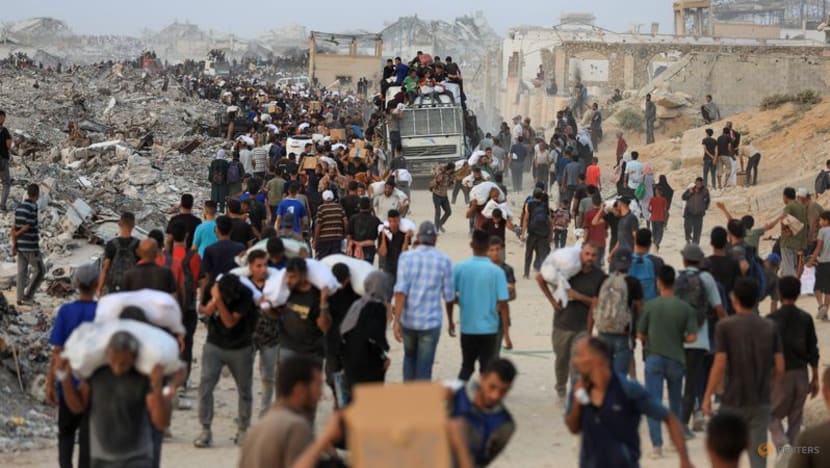Singapore prepared to contribute to Gaza reconstruction once permanent ceasefire reached
Singapore also threw its support behind Egypt's proposed plan for the reconstruction of Gaza.

Palestinians carry aid supplies that entered Gaza on trucks through Israel in Beit Lahia, in the northern Gaza Strip, Jul 29, 2025. (Photo: Reuters/Dawoud Abu Alkas)

This audio is generated by an AI tool.
SINGAPORE: Singapore said on Tuesday (Jul 29) that it is prepared to contribute to the reconstruction of Gaza once a permanent ceasefire agreement is reached.
Mr Kevin Cheok, deputy secretary for Asia Pacific with the Ministry of Foreign Affairs (MFA), delivered Singapore's statement about the peaceful settlement of Palestine and the implementation of a two-state solution.
Speaking at a United Nations conference in New York in the United States, he said that Singapore supports the Egypt-proposed Arab Reconstruction Plan and its vision for reconstruction in Gaza.
The proposal would sideline Hamas and replace it with interim bodies controlled by Arab, Muslim and Western states.
The plan, a counter to US President Donald Trump's ambitions for Gaza as a "riviera", firmly rejects the US proposal for the mass displacement of Palestinians from Gaza.
This is the first time Singapore has thrown its support behind Egypt's proposal at a global forum.
In July last year, Dr Vivian Balakrishnan, Singapore's Minister for Foreign Affairs, said in parliament that Singapore is "prepared in principle" to recognise Palestine as a sovereign state if it has an effective government that renounces terrorism and accepts Israel's right to exist.
He reiterated this in a written reply to a parliamentary question on Palestine in November last year.
In March this year, Arab states adopted Egypt's proposal, while the foreign ministers of France, Germany, Italy and Britain have said that they supported the plan.
It has been rejected by the US and Israel.
What's in the Arab Reconstruction Plan?
Proposed by Egypt, the 112-page Arab Reconstruction Plan will cost an estimated US$53 billion (S$68.3 billion).
Egypt worked with the Palestinians on creating an administrative committee of independent, professional technocrats who would be entrusted with the governance of Gaza after the end of the war.
The committee would be responsible for the oversight of humanitarian aid and managing Gaza's affairs for a temporary period, in preparation for the return of the Palestinian Authority (PA).
Hamas, which has run Gaza since 2007, has said that it agrees to the Egyptian proposal. It agreed not to field candidates to the Cairo-proposed committee, but said it would have to give its consent to the tasks, members and the agenda of the committee that would work under the PA's supervision.
Any reconstruction funding would require heavy buy-in from oil-rich Gulf Arab states such as the United Arab Emirates and Saudi Arabia.
Palestinian Prime Minister Mohammad Mustafa said in March that the reconstruction fund would seek international financing as well as oversight.
NEW INITIATIVES FOR PALESTINIANS
Mr Cheok said Singapore remains committed to helping to alleviate the humanitarian suffering in Gaza.
To date, Singapore has contributed more than US$17 million (about S$22 million) in monetary and in-kind assistance, and has worked with its regional partners and relief organisations to do what it can to help.
"Looking ahead, we are considering the deployment of a medical team to the region to help treat patients from Gaza," he added.
The country also remains committed to supporting the Palestinian Authority's capacity-building efforts through its US$7 million Enhanced Technical Assistance Package.
As part of this effort, the number of scholarships for Palestinians to study in Singapore universities has been increased.
It will also launch two new initiatives next year.
Singapore will collaborate with Japan to train Palestinian Civil Police officers in community policing. It will also launch a young leaders' programme to share its experiences in public administration and governance.
"We hope that these efforts will help prepare Palestinians for their eventual statehood."
VIOLATION OF HUMANITARIAN LAW
At the UN, Mr Cheok reiterated Singapore's comments on the situation in Gaza and again called for a ceasefire and for Hamas to release all remaining hostages immediately and unconditionally.
"What we are witnessing in Gaza today is heartbreaking. The denial of humanitarian aid is causing starvation and a dire lack of essential medical services," he said.
"The reports of people being shot whilst desperately trying to access food are shocking. This is unconscionable and a violation of international humanitarian law."
He called on the Israeli government to immediately lift all restrictions on the delivery of humanitarian assistance, and said the UN and non-governmental organisations must be allowed to resume their aid missions unimpeded.
"We must do all we can to prevent a further loss of life on both sides."
Singapore has "consistently supported the right of the Palestinians to their own homeland based on a negotiated two-state solution", Mr Cheok said.
"We firmly believe that this is the only viable pathway to achieving a comprehensive, just and durable solution to this long-standing conflict. To this end, we are prepared in principle to recognise the State of Palestine."
Singapore's key consideration is that such a move "should help progress" towards peace and a negotiated two-state solution.
"There must be an effective Palestinian government in place that also categorically renounces terrorism and accepts Israel's right to exist," Mr Cheok added.
He also said that Singapore welcomes a letter from Palestinian President Mahmoud Abbas, dated Jun 9, that reiterated "the Palestinian Authority’s continued rejection of violence and terrorism, its longstanding recognition of Israel’s right to exist, and its commitment to the implementation of its reform agenda".
Singapore hopes that these commitments can be implemented fully.
It also urged Israelis and Palestinians to "return to the negotiating table and make necessary, albeit difficult, concessions".
"To continue on the current trajectory will only make the goal of peace even more difficult to achieve, and result in an endless cycle of mutual hatred and violence," Mr Cheok said.
"Both sides must have the courage to break this vicious cycle."
On Tuesday, 15 Western nations including France, Spain, Australia and Canada called on countries worldwide to move to recognise a Palestinian state.
The foreign ministers of these countries issued a joint statement following the conference in New York, which was co-chaired by France and Saudi Arabia.
















